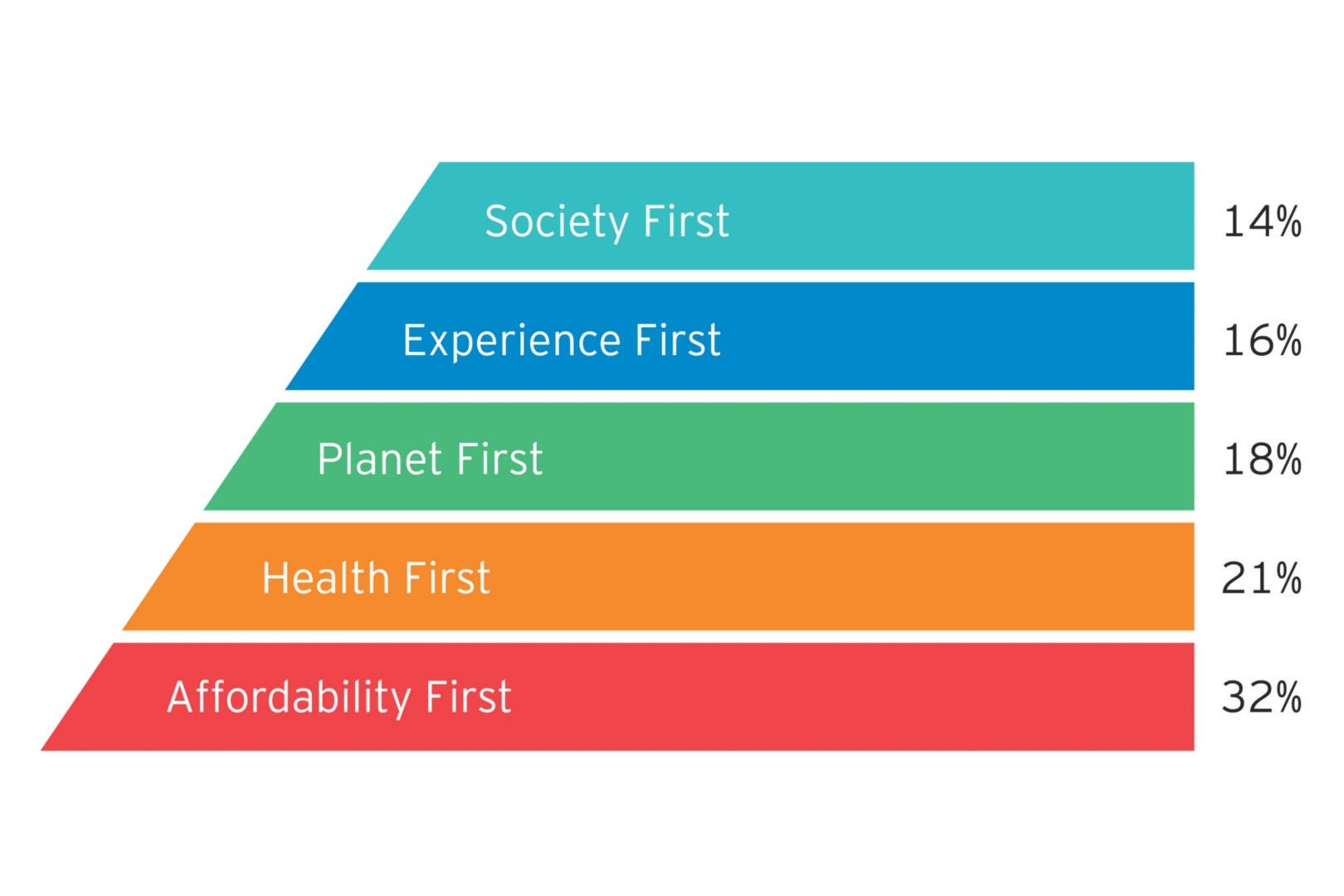EY refers to the global organization, and may refer to one or more, of the member firms of Ernst & Young Global Limited, each of which is a separate legal entity. Ernst & Young Global Limited, a UK company limited by guarantee, does not provide services to clients.

The COVID-19 pandemic has changed our lives – literally within twenty-four hours – but even more so it has changed the habits, perceptions and concerns of consumers. As vaccination programs progress worldwide, we all expect that the crisis will de-escalate. However, many of the sweeping changes we have been experiencing will still continue to affect our lives. The consumer environment of tomorrow and beyond will be totally different from what we have been used to.
In this new environment, the businesses that will stand out and thrive are those that will decipher these changes in a timely manner and effectively adapt.
EY’s Future Consumer Index Greece 2021 (in Greek), brings to light a real wealth of data and information about Greek consumers now, next and beyond, and highlights clear trends, as well as uncertainties and questions about the future. Greek companies that directly or indirectly deal with consumers, can draw valuable conclusions from these findings, helping them reframe their strategy for the future.
The Greek consumer feels tired, impatient and concerned
Greek consumers are tired of the restrictive measures which came as a response to the pandemic, they are in a hurry to return to some kind of normalcy, but, at the same time, they are concerned about the next day. Returning to normalcy will not be a straightforward and smooth process. The speed of return to pre-pandemic daily life will vary from activity to activity, but also between different groups of the population, while, in some areas, what tomorrow brings will differ significantly from what we know today. One clear conclusion that arises from the survey’s findings is that people are not simply consuming more products and services at home. They are rebuilding their whole lives around their homes.
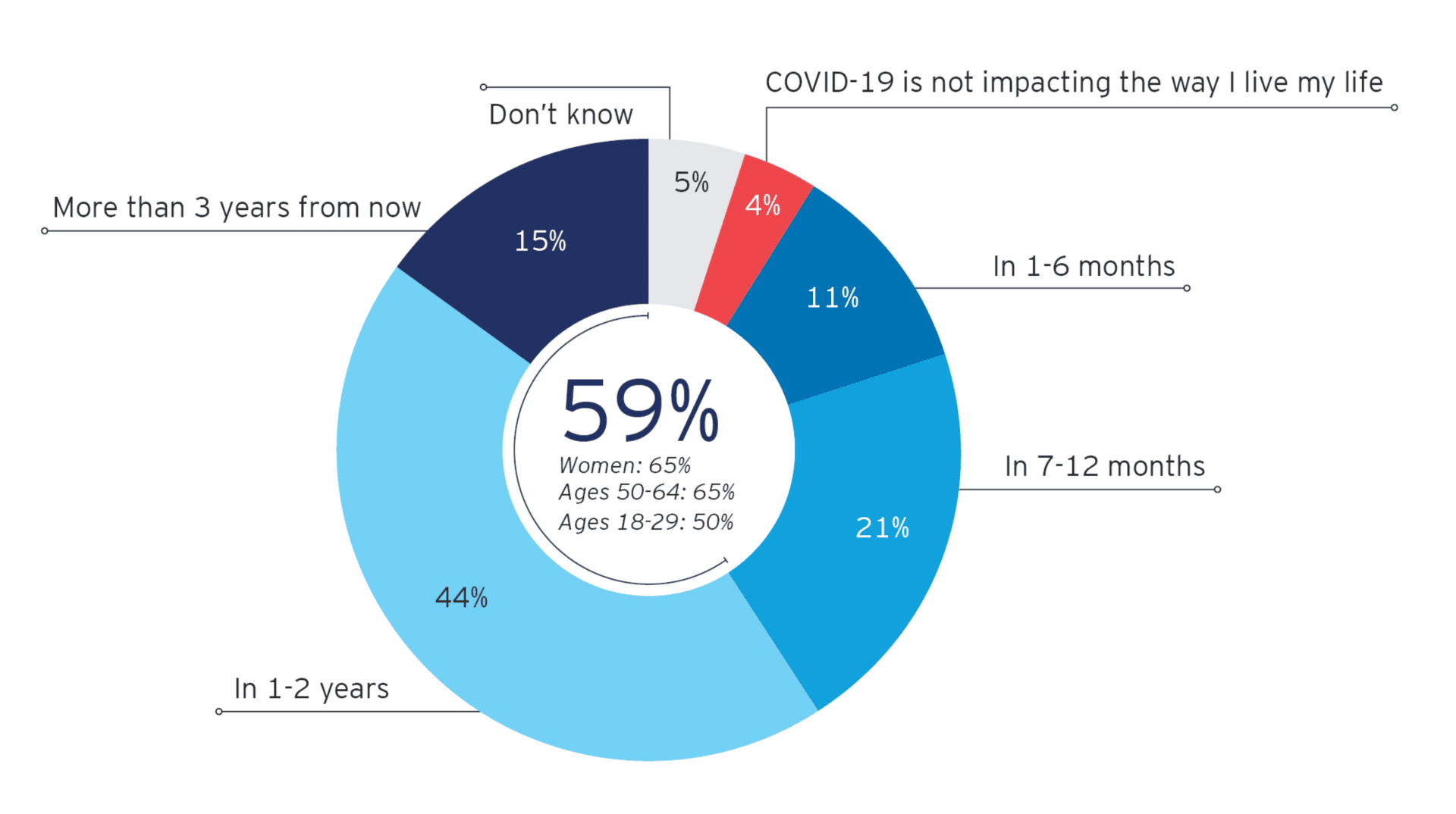
Greek consumers are concerned about the economy and focus on the price of products
Above all, Greek consumers are concerned about the impact of the pandemic on the economy. For this reason, they tend to spend less today, buy only what is absolutely essential and save more, while the price of products and services has become – by far – the most important criterion for their purchases. This trend is unlikely to change over the next three years. Price will remain, by a longshot, the most important purchase criterion. For the majority of products, Greeks will continue to spend the same as they did during the pandemic, while in the few cases where their spending will change, it will mostly decrease. As a result, the largest future consumer segment places affordability first, focusing on prudent financial management.
However, in this environment dominated by uncertainty about the future, many consumers say they are willing to pay more for products with specific characteristics. These include goods produced in Greece, high quality products and products that promise comfort / practicality / convenience. However, consumers’ willingness to pay a premium for a product varies considerably among different segments of the population.
Health is a key concern
Although less critical than concerns about the financial impact of the crisis, health considerations about oneself and about one’s family, are becoming increasingly important. For almost three out of four, the way they maintain their physical and mental health has changed, while a similar percentage show increased interest in health and making healthy choices in the long run. One in four would pay more for products that promote health and wellness. The consumer segment that places health first is the second largest behind those focusing on affordability.
Brands are now under the Greek consumer’s scrutiny
The pandemic has also changed the way Greek consumers feel about and select brands. Two out of five have changed the brands they buy, either to reduce their spending, to support the local economy, local businesses or neighborhood stores, or to switch to private label products.
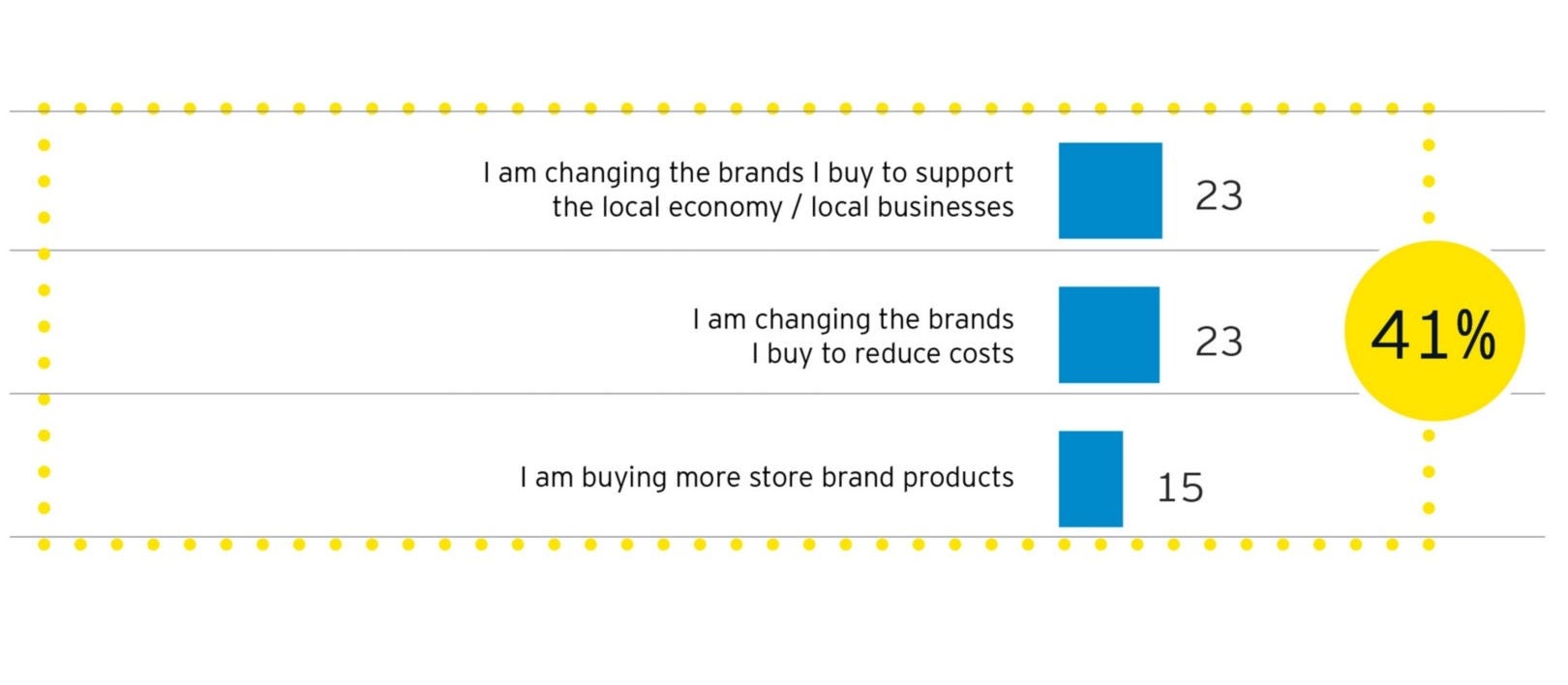
Meanwhile, the experience of the health and financial crisis has made consumers more sensitive to the need for businesses to have a positive impact on society, and has raised their expectations from brands. Three in four consumers believe that brands should behave ethically and in line with society's expectations, and two in three say that brands have an obligation to become catalysts for positive change in the world.
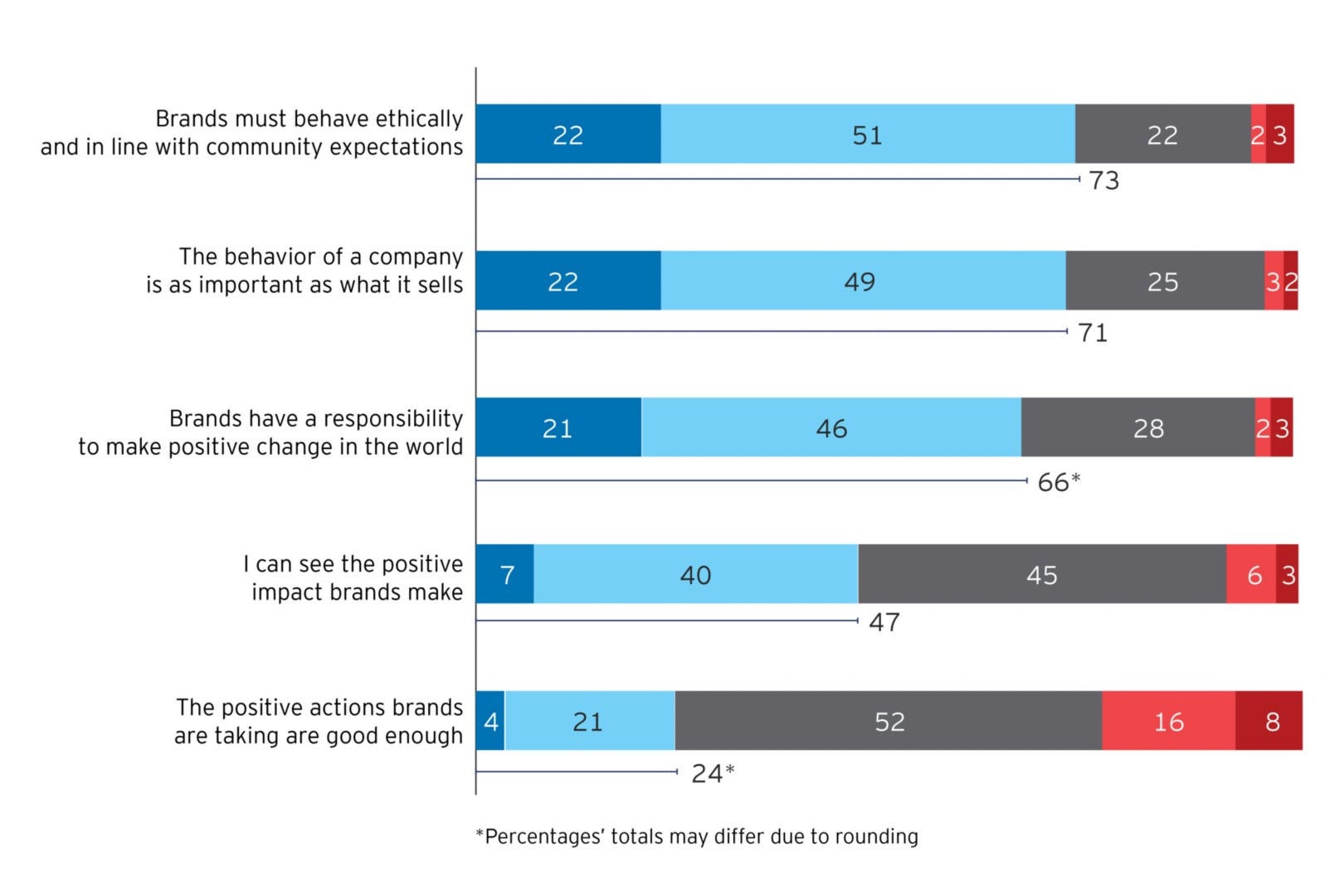
Moreover, if a company, through its actions, loses their trust, Greek consumers appear determined – and more so than consumers in other countries surveyed – to punish it, by withholding or reducing purchases of its products, encouraging others to do the same, or through negative comments on social media.
Increased environmental and social awareness
These expectations from the brands reflect Greek consumers’ increased awareness on social and environmental matters. When asked to self-identify based on what their priorities and way of life will be like in the post-pandemic era, one in three consumers put the planet (18%) and the society (14%) on the spotlight. More than half (53%) say that they will place greater emphasis on the environmental or social impact of the products they buy, in the future.
However, these statements don’t always seem to translate into concrete consumer behavior or choices, or in willingness to support or reward companies aligned with these priorities. Less than one out of three (29%) of those identifying as “Planet First”, are willing to pay a premium for more sustainable products and services, while only one out of five “Society First” consumers would pay more for brands contributing to society.
When determining their attitude and views on life in the long run, Greek consumers report that they intend to re-evaluate the time they spend on what is of value to them – a view held more widely in Greece, than in other countries. The consumer segment that places experience first is ranked fourth in Greece, compared to fifth globally. At the same time, more than half of Greek consumers today, attach more importance to the personalization of products and services to their own needs and preferences. After the pandemic, companies will need to place more weight to this emerging way of life, which mainly, but not exclusively, concerns the younger generations.
Personalization based on my own needs and preferences
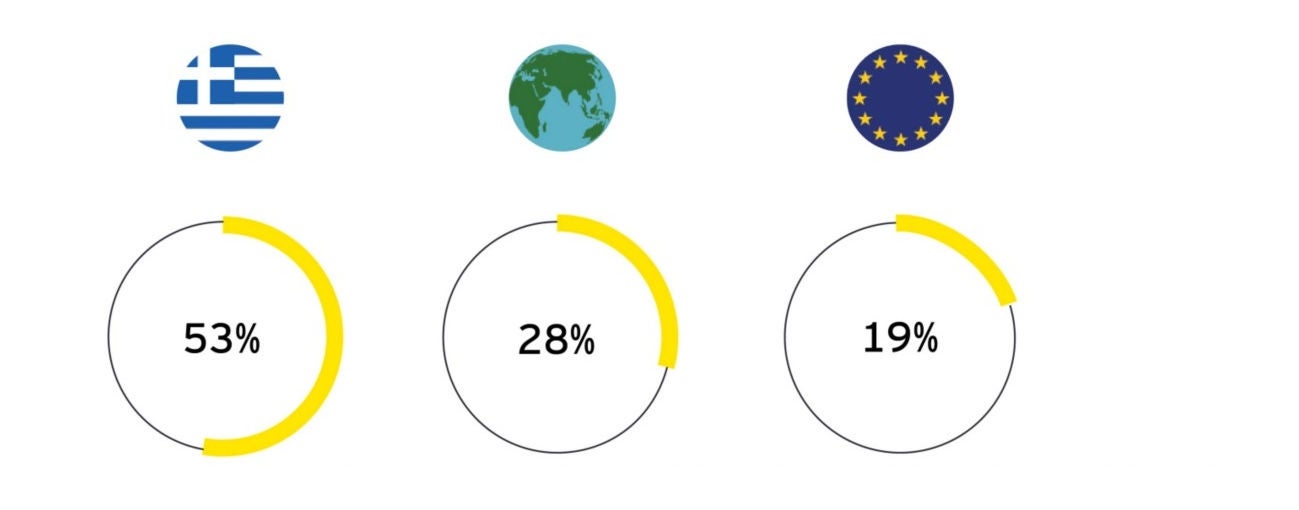
A shift to online shopping, accompanied by some serious reservations
All consumers in Greece, as well as abroad, experienced drastic changes in the way they shop during the pandemic, with a significant increase in e-commerce. Thus, an omni-channel buying model emerges, with online shopping preferred by more than one in two consumers, either in the form of click away (27%), or for buying food (21%), durables(26%), as well as products previously purchased from physical stores (24%).
However, the shift to e-commerce, in such short period of time, found many consumers, as well as retail and distribution channels, unprepared, leading to concerns, especially with regard to delays and high delivery costs. Meanwhile, many consumers still see comparative advantages in physical stores.
Online shopping is now part of our daily lives, as is wider reliance on online services, creating a huge wealth of valuable new consumer data.
In order not to reverse this trend in the long run, the reservations and concerns of consumers must be addressed, along with the various shortcomings of the online channel, so that consumers can enjoy the benefits of a smooth and fast delivery at home.
EY’s recommendations for the retail and consumer goods industry
The profound changes recorded in our survey cover the whole range of Greeks’ everyday lives and, more specifically, their consumer habits: How and where they shop, what they buy, how they consume it, what worries them, what expectations they have from brands and how they imagine the day after the pandemic.
As is always the case with changes triggered by an unexpected external shock, it is difficult to predict which will persist in the long-term, which will gradually fade away, and which may actually intensify. Our experiences at an international, regional and local level, however, show that changes of this magnitude and duration are seldom completely reversed, restoring consumers to their former state.
Businesses in the retail and consumer products industries that want to stand out and thrive, maintain and expand their customer base, and strengthen their connection to consumers in the post-pandemic era, must carefully analyze and study the changes that are taking place and adapt accordingly, developing new capabilities. In reality, they need to redesign their market and consumer approach.
More specifically:
► At an initial stage, companies should immediately map their market and consumers, as everything appears to have changed.
► Based on the new conditions, companies need to re-categorize their product portfolio, customers and end consumers.
► Next, they should relate their product portfolio to customer segments and ask themselves whether they still need (and if they can afford) to make all their products available on all channels, or even to all customers.
► At the same time, a detailed re-evaluation of different service models will be required, such as direct-to-consumer, direct-to-customer, omni-channel, and pick up, as well as combinations of all these.
► New market conditions create new opportunities, as well as the need to explore synergies with other companies. Therefore, a change in business culture will be necessary. “Co-opetition” is now replacing “competition”.
► In the same spirit, the creation and / or participation in value chain ecosystems, rather than relying on linear value chains, and a "I can do everything on my own" mindset, will ensure and enhance business resilience.
► Another basic condition for strengthening companies’ competitive advantages is ensuring end-to-end visibility for the entire value chain, by establishing control towers. After all, brand owners can bring real value to their brands only when they have full visibility.
At some point in the foreseeable future, the pandemic crisis will de-escalate. However, the disruption it has caused, will continue to affect the daily lives of consumers, for a long time to come. It is extremely important for businesses to be able to constantly monitor and quickly decipher these changes, and be even quicker in redefining their operating model. Those that do so successfully, will thrive and stand out the day after.
Summary
EY’s Future Consumer Index Greece 2021 (in Greek), examines the views and perceptions of Greek consumers about the pandemic, its impact on daily life and consumer behaviors, as well as their views and expectations for the future and the return to a new normal.




